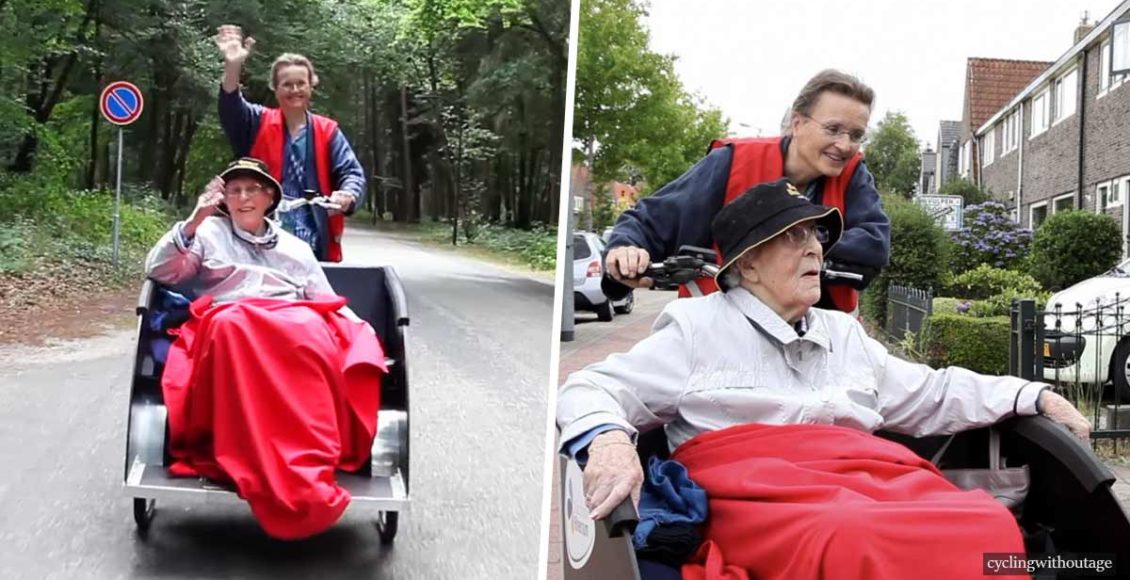Getting out into nature significantly improves our health. Unfortunately, as we age, it’s becoming harder for us to be as active as we wish to be. Along with that, being unable to go out makes us feel lonely. This can be seen especially with seniors. Correlatively, loneliness can lead to depression and anxiety. It also increases the risks of strokes and heart attacks.
One man had an inspiring idea of how taking seniors on rickshaw rides can help them overcome those problems.
For the elderly, there are numerous benefits to having someone to talk to and to go outside with. This inspired Ole Kassow from Denmark to start the Cycling Without Age project, where volunteers take seniors on rickshaw rides to spend time with them and get them into nature.
In an interview with Generations Working Together, Kassow shared that the idea came up in a simple situation.
“I saw an elderly gentleman sitting in front of a nursing home. As usual, I was on my bike and came up with the idea that maybe he wanted to join me and we could get to know each other. I rented a rickshaw and it took off from there. The man became my friend, his name is Thorkild.”
Kassow started the project in Copenhagen in 2012, after seeing the benefits in Thorkild. Now there are more than 1,600 chapter locations around the world that offer Cycling Without Age. The numbers are still growing.
Anyone can volunteer in the program to take seniors on rickshaw rides.
However, the volunteers first ride empty rikshaws to get trained. After that, they take their team leader, called pilot, for a ride before they can start taking real passengers.
Kassow believes that his project gained such popularity because the problem with the seniors who feel left out exists almost everywhere.
“Our modern fast-paced lifestyle means that we value youth and careers and sometimes forget to appreciate the older generation and their wisdom. That means many people become isolated and lonely as they grow old.”
The idea of taking seniors on rickshaw rides to have some fresh air and a good conversation spread so fast, also because of the media interest.
“Luckily the media have taken an interest in what we do and we see how the interest is often sparked by a story in the news. The first international interest came after my TED Talk in the autumn of 2014. Recently the BBC video ‘Amazing Humans’ about Fraser and Mary in Scotland was shown 26 million times. Cycling Without Age addresses challenges of loneliness and active mobility, which seem to appeal to everybody.”
Moreover, having in mind the high levels of pollution in the big cities, Kassow says that cycling is coming to a well-deserved comeback. Covering those two serious general problems, his program appeals to people of different backgrounds, cultures, and ages.
For instance, in Canada, this program is used to help people suffering from dementia. Cycling Without Age is improving their quality of life. The initiative makes them socially, physically and brain active.
What is more, in Scotland, they brought back the zest for life in two 95-year-old twins. Going for a ride on the specially constructed rickshaw in the fresh air with the sun on their faces brings them back happy memories and a sense of well-being.
Cycling Without Age cares about creating strong relationships between generations. By taking the seniors on those rickshaw rides, they wish to put the foundations of a world in which elderly citizens will have access to an active purposeful life. They are doing it by providing an opportunity for the seniors to remain an active part of society and the local community.
“We do that by giving them the right to wind in their hair, the right to experience the city and nature close up from the bicycle and by giving them an opportunity to tell their story in the environment where they have lived their lives.”


